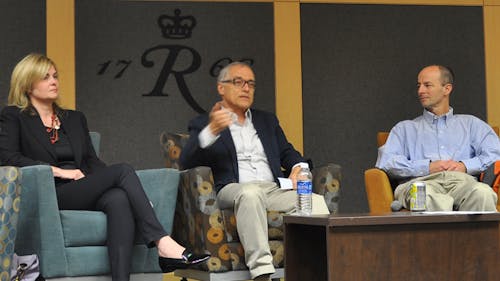Rutgers staff offers tips on success

Only a few of the speakers at last night’s “Navigate Your Path to Success” followed a straight path from first-year experience to long-term career.
In fact, many of them traveled, changed schools and changed careers.
Susan Bennett, assistant director of New Student Programs, taught first-year students the basics of leadership at the seminar, held last night at the Busch Student Center with testimonies and advice from staff and a student.
This annual event happens five times over three nights to give advice, tips and answers for primarily transfer and first-year students, Bennett said.
Thomas Papathomas, Busch campus dean, said not all roads to a career path are straight. Beginning as a biomedical engineer, Papathomas explained how he was too late when he realized what he wanted to do most.
“Open up your eyes before you get into college,” he said. “Take off your blinders and look around you for your career.”
Papathomas was told wisdom was in books and was never taught to think for himself.
He also regrets staying in the same university for his bachelor’s, master’s and Ph.D. degrees.
“Listen to yourself before you listen to others,” Papathomas said. “… I regret not being adventurous ...”
Pernille Hemmer, assistant professor in the Department of Psychology, also shared the sentiment with Papathomas that no direct path exists to anything.
Hemmer grew up in Denmark where education is extremely rigorous. Only 40 percent of students go to high school, and only 40 percent of those students go to college, she said. She was rejected from college in Denmark and swerved her path to come to America.
“It’s okay if you change your mind many times,” Hemmer said. “I love what I do, and it doesn’t feel like I’m going to work everyday. Don’t tell my bosses that.”
Joann Messina, the Busch campus coordinator, used to be a lawyer before she became an expository writing teacher and got involved with the writing program here at Rutgers.
Although students may not have the full answers, they can narrow their decisions through traveling and trying different things, she said.
Students should enjoy the time they have to learn and fully engage themselves, Messina said.
“Work hard though, don’t go drinking all the time,” she said.
Anyone interested in receiving extra help should utilize the free tutoring services the writing center runs on every campus.
Charles Roth, professor in the Department of Biomedical Engineering, was interested in chemistry and math and decided to study chemical engineering.
Roth chose to attend graduate school, but after several trials he ended up doing research at a hospital.
“Don’t sweat it,” Roth said. “Things always have a way of working out.” Roth regrets not getting involved in a research project as an undergraduate. Looking back, he wished he had the time to go into a laboratory and learn something new. He advised students to find what interests them, and find a way to research it.
Peter Spatocco, president of the Engineering Governing Council, had a chance to speak about his experience at Rutgers.
Spatocco, a School of Engineering senior, studied abroad, researched in various groups and formed relationships with his professors. He encouraged everyone listening to do as well.
He particularly advised students to attend office hours with their professors. It made his classes much easier.
“The professors get to know you, and it’s much more personal,” he said.



